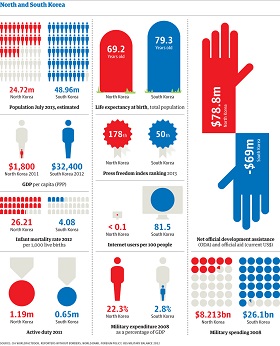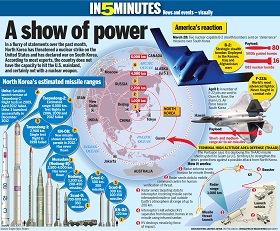In March-April Pyongyang sharply increased its combative rhetoric, declaring a new state of war with South Korea and threatening its enemies with the thermonuclear catastrophe. Recently North Korea have toned down its verbal threats and indicated that it wants peace treaty with South Korea. In this interview Dr. Richard Weitz, Senior Fellow at Hudson Institute, who recently traveled to the region, offers his insights on the sudden change in North Korea’s behavior, policies of regional actors towards it and the role that Russia could play in resolving the tension on Korean Peninsula.
Interview
In March-April Pyongyang sharply increased its combative rhetoric, declaring a new state of war with South Korea and threatening its enemies with the thermonuclear catastrophe. Recently North Korea have toned down its verbal threats and indicated that it wants peace treaty with South Korea. In this interview Dr. Richard Weitz, Senior Fellow at Hudson Institute, who recently traveled to the region, offers his insights on the sudden change in North Korea’s behavior, policies of regional actors towards it and the role that Russia could play in resolving the tension on Korean Peninsula.
Interviewee: Richard Weitz, Director of the Center for Political-Military Analysis, Hudson Institute
Interviewer: Maria Prosviryakova, Editor, Russian International Affairs Council
What did Pyongyang try to achieve by its inflamed rhetoric and threats?
It is all confusing. You normally see this cycle in their behavior. They become very aggressive and rigid. Then they calm down after getting some kind of concessions or getting somebody’s attention. So, you can take it as that pattern again. But there are also specific instances that might have triggered the rise: the change of the governments in China, South Korea and Japan. Maybe North Korea wanted to establish itself as a nuclear power to improve its negotiating positions before those changes are completed.
Why is North Korea dialing back now?
And they are dialing down now. China appears to put some pressure on them and the U.S., South Korea and Japan didn’t really respond positively to their rhetoric. So, maybe that was the reason. It is also probably due to a lot internal developments that we don’t fully understand.
What is your take on how the current internal political factor influences the dynamics of the problem?
That is the real mystery. We just don’t know how much authority Kim Jong-un has. Is he trying to show he is as tough as his father and grandfather by standing up to the United States, launching missiles and laying out belligerent material and actions? Or is it the fact that he is doing this temporarily so that he can enhance his power and then get major concessions? Or he is not in charge at all, and, perhaps, it is the military who is calling the shots. We just do not know that.
China appears to be finally enforcing UN sanctions. In Mid-May the Bank of China said it had ended all business with North Korea’s chief overseas bank. Does it mean that North Korea’s most important economic supporter, food and energy supplier has lost its patience and is ready to go for the regime’s financial jugular?
Chinese experts that I spoke with during my recent visit to the region told me that their governments have not really changed the substance of their policy. The rhetoric has become a bit firmer, they closed down some banks, they tightened up a bit. But I think that their policy is fundamentally unchanged, which is they would not want to see the regime change in Pyongyang, at least abruptly. They would like to see a gradual slow transition - best following the path that China itself has pursued - moderating its behavior, becoming more open to international engagement and so on. You are just seeing variation within that broad policy.
So, you mean that under the new Chinese leadership China’s policy towards North Korea will be pretty much the same?
So far, they have indicated that there will be no major change unless there is a major change in China’s overall foreign policies with a number of issues, such as the United States. China could decide to confront the U.S. more broadly or fundamentally realign in partnership with the United States. And then their policy towards North Korea might follow that kind of a change.
How much influence do you believe China has on Pyongyang?
It has more influence than anybody else. But the new leadership in North Korea has been very defiant of China’s wishes repeatedly, and their influence is limited because there is a limited amount of punishment that China will inflict on Pyongyang.
South Korea’s new president Park Geun-hye has proposed a strategy for drawing the North out of its isolation – “Trustpolitik” doctrine, which was endorsed by Barack Obama. Can it become a viable and effective way out of the crisis on the Korean Peninsula?
Park Geun-hye’s policy is not so much different from the policy her predecessor had towards North Korea. But, unlike her predecessor Lee Myung-bak, who was partly discredited not for any faults of his own but because his policy didn’t seem to be yielding results, Park can start with a new slate. She can make the same kind of conditions that he did, but starting off on a new footing makes it a bit more possible that she would get results. But so far we haven’t seen anything.
What role can Russia play in this process?
Russia is probably the most interesting actor. It has much more flexibility than some of the other countries. It has a good position to be a mediator. Russian and U.S. policies can cooperate very well - the goals are very similar. Again, there is a difference in priorities and tactics, and we are out of sync a bit. In the sense that the U.S. is willing to pursue more confrontational policy than the Russian government would like. But Russia would really like to resolve the Korean Peninsula’s tensions, because Russia then can build the Trans-Korean pipeline and use that as another avenue to reach out to rest of East Asia. And that would benefit U.S. goals by raising living standards in North Korea and the state of regional stability. Although, it is an important goal for Russia, it is not the highest priority. Russia really has more potential to make a positive contribution.
Dr. Weitz, thank you so much for the interview.






